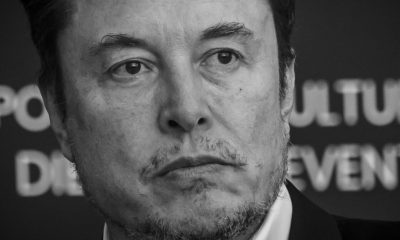Entertainment
‘Jessica Jones’ ended well, but Netflix’s Marvel shows deserved better

There was an idea. Expand the Marvel Cinematic Universe with a series of comic book shows about heroes whose lives were more grounded than those of the high-flying Avengers, and whose stories would be told in a prestige-ish TV format on Netflix. Since the release of Daredevil Season 1 in 2015, there have been thirteen total seasons of Netflix’s Marvel shows, but with the release of Jessica Jones Season 3 their time on the streaming platform has come to an end. Disney came to collect on its intellectual property and the Defenders are officially disbanded.
It’s pure coincidence that Jessica Jones would be the show to close out Marvel’s brief and inconsistent Netflix experiment; the cancelation notices for Daredevil, Luke Cage, Iron Fist, and The Punisher rolled in while Season 3 was already in production. Suddenly, the third season of one of the better streaming Marvel shows had to function as a double finale, for both Jessica Jones the series and as the final chapter in the sometimes intersecting stories of the Netflix heroes.
Jessica Jones Season 3 almost manages to pull off being a series finale for itself, even if the season didn’t top the quality of its first explosive entry. It does not, however, close the narrative doors left open by Netflix’s other series, and knowing that its finale is the last anyone will see of the New York–based heroes makes its ending more anticlimactic than it would have been if the other shows had new material in the pipeline. As unfair as it is to be disappointed that a show written before the collapse of its universe doesn’t acknowledge or play into that importance, it’s also hard not to wish that Netflix’s Marvel shows went just a smidge farther in telling their joint story.
It’s also hard not to wish that Netflix’s Marvel shows went just a smidge farther in telling their joint story.
For a decade the MCU has done a tremendous amount of work selling the concept of interconnected heroes in a shared world, one that becomes larger and more complicated with every entry in its roster. The Netflix shows, despite being marketed as part of the MCU, never quite meshed with that universe or each other, with the exception of a so-so Defenders series that brought the four title characters together to battle Sigourney Weaver and dig up some dragon bones. Each Netflix hero had their own story and operated more or less independently, which was fine up until the point where the separations felt incompatible with the ethos of the MCU and logic itself.
For example, in Jessica Jones Season 3, a new vigilante shows up in New York, starts fighting crime, and is suddenly front page news all over the city. The same city where aliens crashed a space worm into Grand Central Station seven years ago and a child in a spider costume stitched together the Staten Island Ferry with an army of Iron Man suits in support. A new vigilante in New York is about as interesting as a Starbucks at this point, and the show does nothing to acknowledge the fact that Jessica’s external world is one defined by strange and extraordinary heroes.
Even if the Defenders wasn’t the best of the Netflix MCU shows, it established dynamics that should have changed the individual shows that followed it. There are numerous times in Jessica Jones Season 3 and other post-Defenders Netflix shows when simply remembering the framework of the MCU would move the plot faster. If Jessica wants to get rid of a serial killer without dirtying her or Trish Walker’s hands, then it sure would be a shame if Frank Castle found out that killer spent half the season standing in front of a glass window. Daredevil Season 3 featured a villain whose superpower was throwing things at people — sounds like a job for the completely indestructible man who lives twenty minutes away in Harlem.
What’s more frustrating is that when the Netflix MCU did lean in on those connections the shows were almost always better for it. Daredevil’s Karen Page provided one of The Punisher’s most romantic and heartbreaking arcs, and one of the only redeeming episodes of Luke Cage Season 2 could have functioned as a backdoor pilot for a spinoff starring Luke and Iron Fist. The film branch of the MCU has generated an enormous amount of goodwill on the virtue of its team ups and cameos; now the possibility for Netflix to do the same is gone.
There is one great moment in Jessica Jones Season 3 that speaks to that idea. After a devastating realization, Jessica comes home to find Luke Cage standing outside of her apartment. The issue Jessica faces is startling similar to one he faced back in the first season of his show, and he offers her comfort and advice. Those are the connections that feel most real in the MCU. With so many heroes existing in New York at the same time, it only makes sense that they would lean on each other despite their differences. But the series ends forty minutes after that moment, which only emphasizes how good and rare it was.
At this point Disney can do whatever it wants. There’s a three year waiting period before they can use the Netflix Marvel characters again and truly hopeful fans can cross their fingers for Jessica, Luke, Matt, and Danny reappearing on a Disney+ show in 2021. Until then though, the Netflix MCU ends with Jessica Jones strutting through the Grand Central Station Tony Stark rebuilt after the Chitauri attacked New York in 2012, steadfast in her mission to protect a city where Doctor Strange and Spider-Man still exist thanks to the time-traveling adventures of the Avengers. It’s technically all connected, even if Netflix never wanted to admit it.

-

 Business6 days ago
Business6 days agoTesla’s new growth plan is centered around mysterious cheaper models
-

 Business5 days ago
Business5 days agoXaira, an AI drug discovery startup, launches with a massive $1B, says it’s ‘ready’ to start developing drugs
-

 Business5 days ago
Business5 days agoUK probes Amazon and Microsoft over AI partnerships with Mistral, Anthropic, and Inflection
-

 Entertainment4 days ago
Entertainment4 days agoSummer Movie Preview: From ‘Alien’ and ‘Furiosa’ to ‘Deadpool and Wolverine’
-

 Business4 days ago
Business4 days agoPetlibro’s new smart refrigerated wet food feeder is what your cat deserves
-

 Business6 days ago
Business6 days agoTwo widow founders launch DayNew, a social platform for people dealing with grief and trauma
-

 Entertainment6 days ago
Entertainment6 days agoTesla’s in trouble. Is Elon Musk the problem?
-

 Business4 days ago
Business4 days agoZomato’s quick commerce unit Blinkit eclipses core food business in value, says Goldman Sachs






















